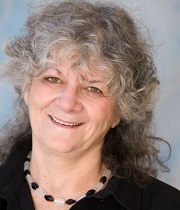Ada Yonath

Ada Yonath
2009 Nobel Prize in Chemistry
Even at a young age, Professor Ada Yonath was unstoppable. At five years old, she broke her arm trying to measure the height of her balcony ceiling using stools and chairs because she just had to know. At 83, this same curiosity keeps her as the Martin S. and Helen Kimmel Professor of Structural Biology at the Weizmann Institute of Science, and Director of its Helen and Milton A. Kimmelman Centre for Biomolecular Structure and Assembly.
As a young scientist, Prof Yonath directed that curiosity to the mystery surrounding protein biosynthesis. She wanted to determine the structure of the ribosome, an intracellular machinery that reads the genetic code and produces proteins. This was not only a huge feat, but one deemed impossible as established scientists had already tried to do so and failed. In fact, Prof Yonath was met with ridicule and disbelief from the scientific community, with some calling her a dreamer and others a fool.
She continued on anyway, seeing the shortcomings of others as a source of comfort and not distress. She thought, “If I fail too, then I’m no worse than the best scientists.” It is this perseverance and her innate curiosity that made her succeed, eventually winning the Nobel Prize in Chemistry in 2009 (shared with Professors Thomas Steitz and Venkatraman Ramakrishnan) for her studies on the 3D structure of the bacterial ribosome. This made her the first, and to date the only, Israeli woman to win a Nobel Prize.
But it is not only perseverance and curiosity that got her to the summit of success. In the late 1970s, Prof Yonath met the late Professor Heinz-Günter Wittman, former head of Max Planck Institute for Molecular Genetics in Berlin, who was also passionate about how ribosomes work. This marked the start of a 25-year collaboration, which she says contributed enormously to her work. She mentions, “Without this collaboration, I’m not sure I could have done it.”
Prof Yonath still works on ribosomes to this day. Discovering the ribosomal structure only led to more questions on the mechanisms of action of ribosomes and how antibiotics can block these actions. Now collaborating with different groups, her work paves the way for improving existing antibiotics and creating better ones. She has expressed that although collaborations are not always necessary, they are wonderful when they happen.
When asked how she sustains her interest in her work, she emphasised curiosity as a driving force. To young scientists, she offers this advice: They must love what they do and they must have a question to answer.
Along with the 2009 Nobel Prize, Prof Yonath has been awarded the 2002 Israel Prize, the 2008 Albert Einstein World Award of Science, the 2010 Wilhelm Exner Medal and the 2011 Marie Curie Medal. In 2020, she became a Foreign Member of the Royal Society.

